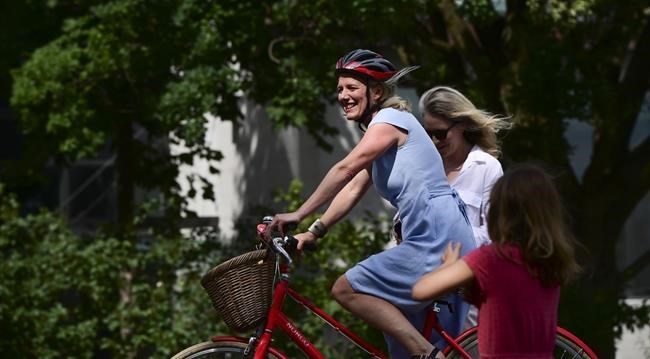OTTAWA — Infrastructure Minister Catherine McKenna says as she leaves politics she will use what platform she has to push for climate action and an end to the hateful comments and personal abuse targeting public figures.
McKenna told Prime Minister Justin Trudeau on the weekend that she won't be seeking re-election as the Liberal MP in Ottawa Centre, citing a desire to spend more time with her three children, and pursue climate action from outside government.
She insisted it is not because she was frustrated and said she is proud of the accomplishments of the government, including a the national climate plan and price on pollution.
"I just told you the truth," she said. "I want to spend more time with my kids and there are other ways to tackle climate change," she said at a news conference next to Ottawa's famed Rideau Canal Monday morning.
Her departure was largely unexpected and has only heightened already intense speculation that Trudeau is readying to call an election later this summer. McKenna, 49, was first elected just six years ago and, as the environment minister in charge of the government's pledge to overhaul federal climate policy, was one of the most prominent ministers in Trudeau's first cabinet.
She was also singled out for torrents of online abuse that eventually spilled out of the virtual reality and to in-person tirades.
In 2017, she got international attention for calling out former Conservative MP Gerry Ritz, who took to Twitter to refer to her as "Climate Barbie," a sexist insult born on the far-right website The Rebel.
She told The Canadian Press just before the 2019 election that she had begun to sometimes require security because of the growing threats. Men screaming abuse at her when she was out with her children was not a rare occurrence.
Days after that election her campaign office was vandalized with a degrading sexist slur.
After the 2019 election when Trudeau shuffled her out of environment to the infrastructure portfolio of cabinet, many speculated he was trying to give her a break from the intensity of the abuse she was taking.
While her role has been less prominent, particularly during the pandemic, the abuse hasn't stopped. An RCMP officer stood guard near her outdoor news conference Monday, confirming he was there as security for a cabinet minister.
The prime minister has long had constant RCMP protection in Canada but it is far more rare for cabinet ministers to require it.
But she said as she prepares to leave politics — she has offered to stay in Infrastructure until the election if Trudeau desires — she intends to be a voice to stand up for others facing similar attacks.
"I've thought about this a lot," she said. "I have had my share of attacks but I realize that's just noise, that people want you to stop doing what you're doing, they want you to back down. But guess what? We didn't back down on the price on pollution. We doubled down."
McKenna said she learned a lesson in waiting too long to call out what was happening, and finally decided she couldn't be quiet about it any longer.
She said the outpouring of support from Canadians in response was heartening and that is what she wants young women or anyone feeling marginalized or intimidated by the sometimes toxic environment of public life.
"I will do everything to fight that," she said. "Why? I'm gone but I want girls, I want members of the Indigenous community, Indigenous Peoples, Black Canadians, I want new immigrants. I want members of the LGBTQ2+ community to feel safe in politics. And we've heard that that's not always the case. So I think it's incumbent on someone like me, because I kind of don't care anymore, I will fight that. Because we need good people in politics."
This report by The Canadian Press was first published June 28, 2021.
Mia Rabson, The Canadian Press



